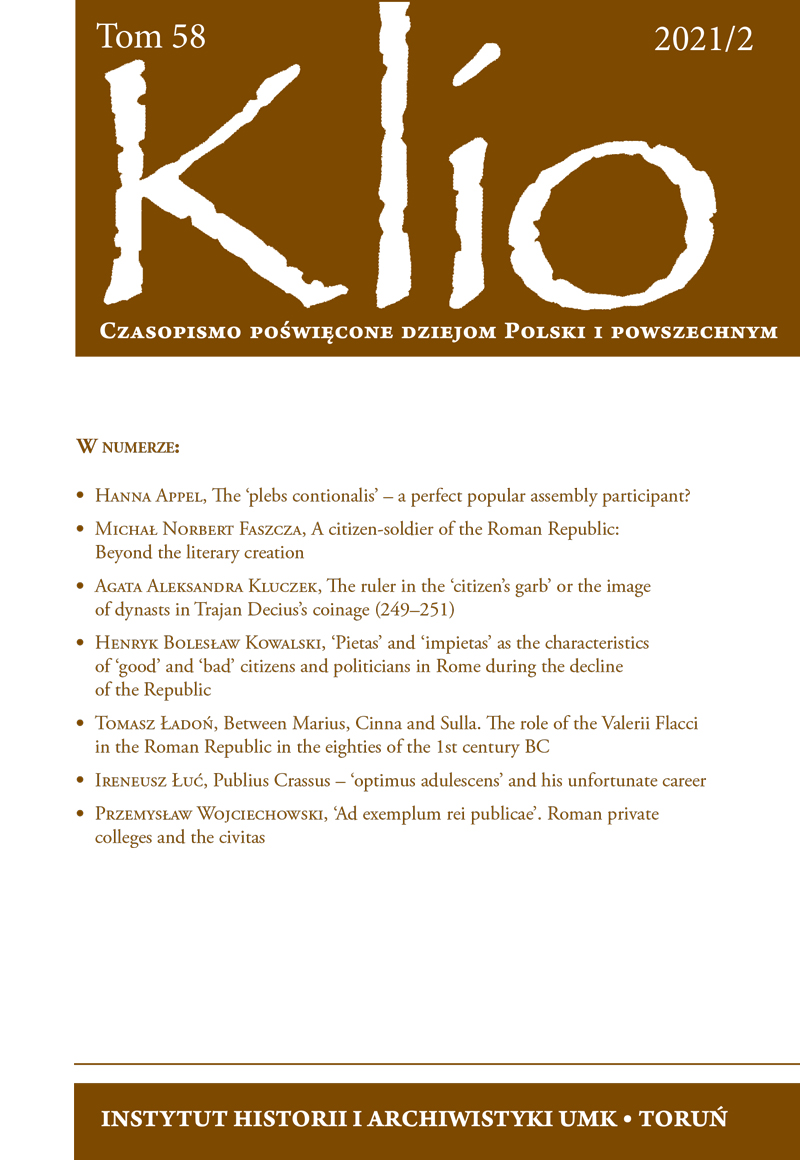Ad exemplum rei publicae
Roman private colleges and the civitas
DOI:
https://doi.org/10.12775/KLIO.2021.016Słowa kluczowe
Roman History, Roman colleges, civic ethosAbstrakt
The starting point for these studies is the opinion that Roman colleges were to be a copy of the respublica. I have attempted to prove that 1. with regard to organisation, copying municipal (civic) solutions was usually limited to adopting the nomenclature (names of corporate offices) and some institutions (corporate treasury, gatherings (meetings) of corporate members) known from public life. 2. In the sphere of symbols, referring to civic ideals/civic ethos was one of the bases of corporate identity. Both the system of values and the tools used to create the college’s image, founded on this system, were identical for colleges and the community of citizens. In other words, an ideal college member was also an ideal citizen.
Bibliografia
BIBLIOGRAPHY
F.M. Ausbüttel, Untersuchungen zu den Vereinen im Westen des Römischen Reiches, Kallmünz Opf. 1982.
A. Bendlin, Associations, funerals, sociality, and Roman law. The collegium of Diana and Antinous in Lanuvium (CIL 14.2112) reconsidered, in: M. Öhler (Hg.), Aposteldekret und Vereinswesen, Tübingen 2011, p. 207-296.
J. Carlsen, Vilici and Roman Estate Managers until ad 284, Rome 1995.
F.M. De Robertis, Il fenomeno associativo nel mondo romano. Dai collegi della repubblica alle corporazioni del Basso Impero, Roma 1981.
F. Diosono, Collegia. Le associazioni professionali nel mondo romano, Roma 2007.
J.S. Kloppenborg, G. Wilson (ed.), Voluntary Associations in the Graeco-Roman World, London and New York 1996.
J. Liu, : the guilds of textile dealers in the Roman West, Leiden-Boston 2009.
G. Mennella, G. Apicella Le corporazioni professionali nell'Italia romana: un aggiornamento al Waltzing, Napoli 2000.
J.S. Perry, The Roman Collegia. The Modern Evolution of an Ancient Concept, Leiden - Boston 2006.
D. Rohde, Zwischen Individum und Stadtgemeinde. Die Integration von collegia in Haffenstaeden, Mainz 2012.
H.L. Royden, The Magistrates of the Roman Professional in Italy from the First to the Third Century A.D., Pisa 1988.
N. Tran, Les membres des associations romaines: le rang social des collegiati en Italie et en Gaules, sous le haut-empire, Rome 2006.
O.M. Van Nijf, The Civic World of Professional Associations in the Roman East, Amsterdam 1997.
J.P. Waltzing, Étude historique sur les corporations professionnelles chez les Romains depuis les origines jusqu’a la chute de l’Empire d’Occident, Bruxelles-Louvain, I-IV, 1895-1900.
P. Wojciechowski, Czciciele Herkulesa w Rzymie. Studium epigraficzno-antroponomastyczne (I-IV w. n.e.), Toruń 2005.
P. Wojciechowski, The social structure of members of religious associations in Italy (1st-3rd century AD), Eos 102/2, 2015, p. 305-320.
P. Wojciechowski, Patronage in Roman religious associations in Italy under the principate, “Res Historica” 43, 2017, p. 27-40.
Pobrania
Opublikowane
Jak cytować
Numer
Dział
Licencja
Prawa autorskie (c) 2021 Przemysław Wojciechowski

Utwór dostępny jest na licencji Creative Commons Uznanie autorstwa – Bez utworów zależnych 4.0 Międzynarodowe.
Statystyki
Liczba wyświetleń i pobrań: 666
Liczba cytowań: 0



